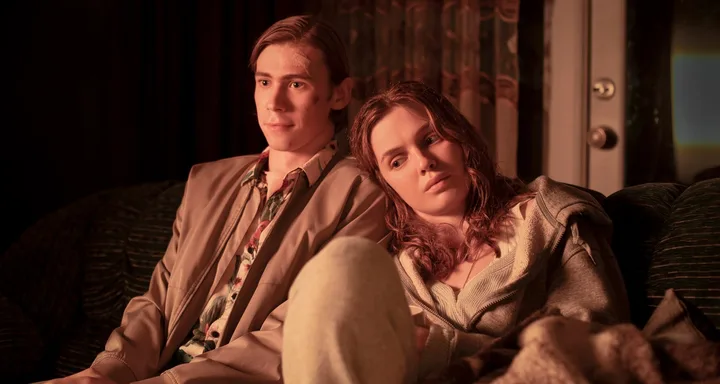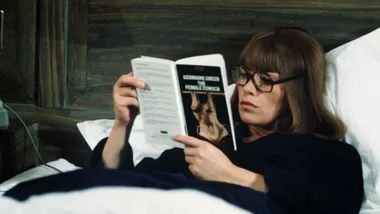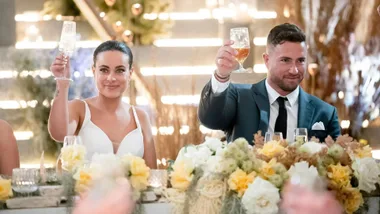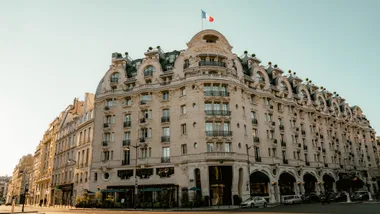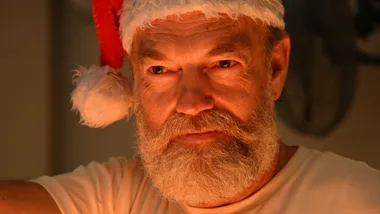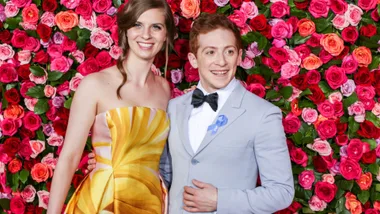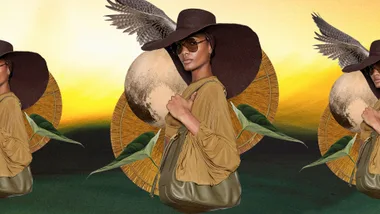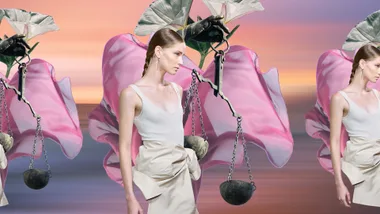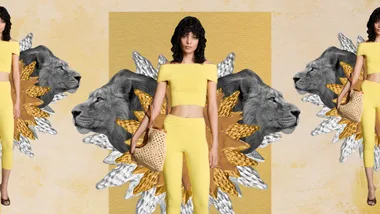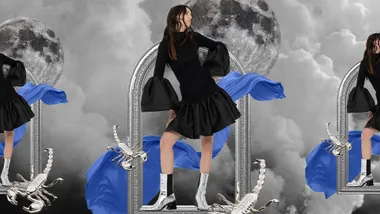After a string of breakout roles, including Looking for Grace and The Daughter, Australian actress Odessa Young set her sights on Hollywood (or rather, the big city lights of New York City)—just days after her 18th birthday, no less. Since then, the now 22-year-old actress has officially been pegged as one to watch, having scored roles alongside Elisabeth Moss in Shirley and The Crown’s Olivia Colman in Mothering Sunday.
Taking on her newest project, Young stars in Amazon Prime Video’s latest drama The Stand, based on the 1979 Stephen King novel of the same name—a role that is only predicted to confirm her breakout status.
Just like the novel, the series tells the story of a pandemic of a weaponised strain of influenza—known as Captain Trips—which wipes out 99 per cent of the world’s human and animal population. In the U.S., a few lucky survivors who prove to be immune find themselves navigating their way through the decimation. In a community set against the backdrop of the former Boulder, Colorado, a community is led by Mother Abigail (played by Whoopi Goldberg), who strives to rebuild a positive society. But, the “Dark Man” Randall Flagg (Alexander Skarsgård), has other plans in mind, ending in the ultimate showdown between good and evil.
Young stars as Frannie Goldsmith in the newly-released series, featuring a “new coda co-written by King himself”, that gives the character that gives the character a different portrayal than the original book. Below, marie claire speaks with the rising star about her latest project, The Stand, and how her Australian roots have kept her grounded in Hollywood.
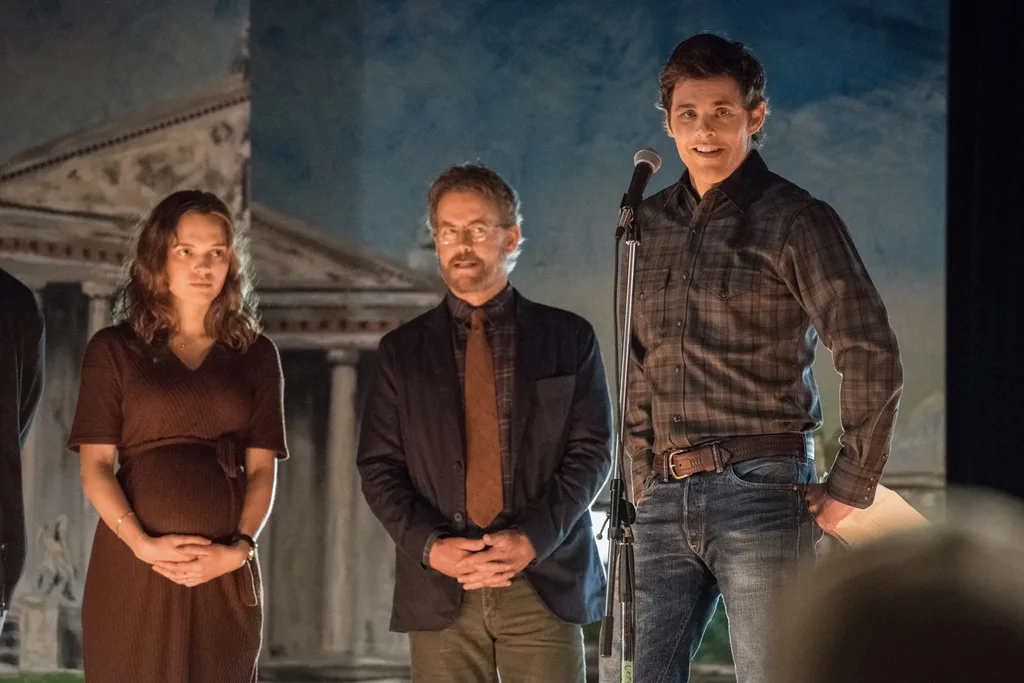
It’s particularly interesting that this Stephen King story is being retold in 2021 considering the current situation we’re in—it’s truly an art-imitates-life experience. What were some of the parallels you found with this story and life during the current global pandemic?
I think something that I really love about The Stand, just as a story in general, Stephen King was always transparent about this and the reason that he wrote it was that it’s not necessarily about the pandemic—the pandemic is kind of an excuse. It’s a way, it’s a catalyst, to enter this arena where the characters get to feel like everything’s starting anew and it’s lawless.
I think what’s kind of very interesting about the parallels is, even aside from the pandemic stuff, which is very spookily prescient, having been written in the seventies, I think something that’s really stood out to me is kind of the responsibilities that people find themselves with after this kind of massive event. It does feel a little bit lawless, and I think that everybody is yearning for some kind of leadership.
That’s why people in our stories find Randall Flagg or Mother Abigail, because everybody is searching for direction. I think that, to me, is kind of the most spooky parallel is because I think everybody has realised how much a part of a global community we are and how much we need that, but also how that means we have to kind of try to uphold it.
I mean, I want to know who Stephen King’s psychic is!
In the series, your character Frannie is pregnant, in a world where most of humanity has been wiped out completely. Did this role come with an extra emotional attachment considering that, and considering potentially the many mothers and mothers-to-be watching this series amid a global pandemic?
I mean I do remember the first pregnant person I knew to have a baby during the pandemic. I hadn’t even considered how that was possible before. I hadn’t considered that ‘Oh my God, of course, people are still going to be having babies.’ And I think that it is, for me, a very emotional role to take on.
I think that, aside from the fact that anybody bringing new life into the world is incredible, if you’re not second guessing yourself, or if you’re not worrying if you can do it right, or if you’re just going to mess up, then I think that you’re superhuman. I think everybody bringing a child into the world has these anxieties, and then especially to do it during a time of global crisis is a pretty, pretty powerful action.
So I have not ever been pregnant. I am not bringing a child into the world anytime soon, but I definitely feel extremely connected to the idea that now, more than ever, to use the kind of oft said caveat, now more than ever it might be harder to kind of keep your head on straight. And I do just respect and admire all of the people bringing new life into the world, especially during this time.
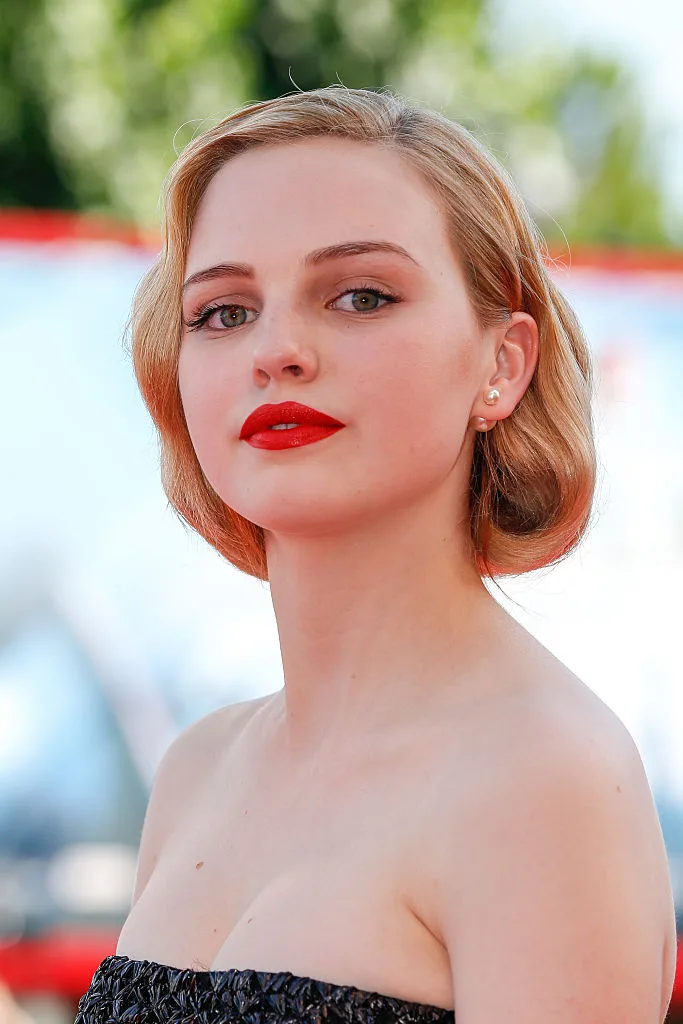
You have said in a previous interview that King was somewhat regretful about Frannie not getting to stand against evil in the original story he created, which is something that has been given new life in this recent adaptation. How does that feel to get to modernise such an iconic character of King’s like that?
I feel extremely lucky! At the time that we were shooting, it didn’t actually hit me that that’s what was going on. Then, the more I started to think about it I kind of realised that there’s something that is so beautiful about The Stand as a piece of work in general and that it has been a living, breathing organism since it was first published in the seventies.
King has updated it since then in the nineties, and then there was a mini-series which gave it a new life. So I just loved the porousness that this was. I love how King, as an author and a storyteller, can respond to the people who are digesting his work and keep it active. It means that the story is bigger than anybody can ever really put their fingers on. And so being a part of that, to be tasked with a really kind of colossal undertaking of being Frannie in this new iteration in which King has such a pretty heavy influence on, to the point that he wrote it—it feels pretty phenomenal.
You’ve also previously noted the difference between pre-pandemic Frannie and a post-pandemic Frannie—which is an interesting observation considering our current situation. How does the character evolve and how does that become relevant again to a world living through a global health crisis?
I think it’s just kind of what I was saying before, people have all of a sudden become so much more aware of their personal responsibilities to themselves and the people around them. I think it’s happened in the way that we feel a responsibility to keep people safe, to keep our loved ones safe, or just our community in general.
But I also think it’s a responsibility that we have towards our mental health, and I think that’s what I mean about Frannie. I think that, due to these unfortunate circumstances of the pandemic, she had to grow up a lot quicker than she ever expected to, and realise these responsibilities that she has being, first a new mother and second, a young woman. And third, one of the only surviving people on the planet. So there’s this kind of myriad of reasoning behind her stepping up to the plate, if you will.
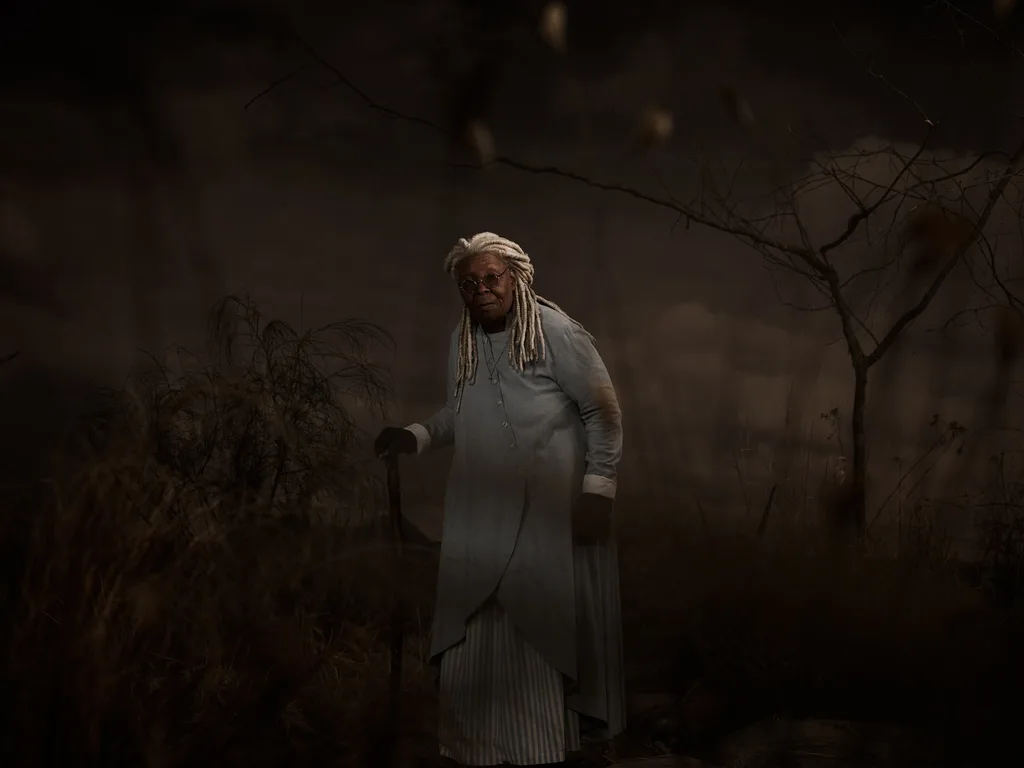
While it is quite an emotional story throughout, especially for your character, what did you find most enjoyable about portraying this particular character and what she goes through?
So many things. Just as a character trait, I love Frannie’s lightness and her quirks and her charm. I think that that’s a really kind of welcome shade to a lot of the things that are very dark and I had a lot of fun kind of bringing that levity into it. And kind of on a bigger picture scale, I mean I really did appreciate the task of trying my hand at bringing to life a character that is so well known and so well-loved by many Stephen King fans and just people who know of her in general. I always welcome a challenge and I think that she was a challenge, but also an incredibly gratifying experience.
The Stand gave you the opportunity to work with some incredible actors, one being icon Whoopi Goldberg. How was that experience?
I mean it was incredible. It was so incredible. I got to live with her in my first week of shooting, and we had some pretty big scenes between me and her and she is, I mean aside from being an incredible actor, she wasn’t Whoopi Goldberg. She was standing there as mother Abigail, and you had to remind yourself that that’s the person that you’ve seen on the screen for your entire life.
You’ve just wrapped on Mothering Sunday, which also stars The Crown’s, Josh O’Connor and Olivia Coleman, as well as Colin Firth. What was it like working with that incredible cast?
I mean absolutely delightful. As an Australian, I think I really respond to British humour quite well. So I have to say that they were some of the funniest cast members I’ve ever worked with in my life. Yeah. They’re all just incredible people and incredible actors and a complete joy to work with. And it’s always very helpful when you have pretty dramatic or extreme subject material to have a little bit of lightness. And so I just really appreciated that, those shades.
Do you think some of your Australian sensibilities or traits have helped you navigate the world of Hollywood as you’ve been doing more and more projects?
Yes, I do. I think that there’s kind of a work ethic that I really appreciate being taught when I was starting out, which is just put your head down and do the job. And it’s not about you, it’s about the work. And it’s about the sacrifices that you make as a performer to have the work be the best it can possibly be. And I really appreciate that, being brought up through that mindset, because I think that it keeps one grounded and it’s a really, really hard job to be grounded in.
The Stand is available now to stream on Amazon Prime Video.
